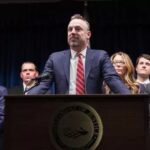
–>
July 24, 2022
If you have been paying any attention at all to academia in this country, you know it has entered a dark age, neglecting what my alma mater once described as its function: A place for the sifting and winnowing of ideas. Today’s academic “marketplace” increasingly sells only one product, drives others from the agora with a variety of bullying actions, and threatens both the sellers and purchasers into silence about alternate products.
‘); googletag.cmd.push(function () { googletag.display(‘div-gpt-ad-1609268089992-0’); }); }
Here’s an eye-opener to illustrate the extent of the assault on free speech and free thought.
We are entering a future where blacklisting, censorship, and the abuse of power will become the norm, because apparently the new generation thinks such things are always justified, if they have been offended in any way. From a recent poll of 2,000 students at 130 colleges: In one eye-opening finding, 74 percent of undergrads endorse the view that a professor who says “something that students find offensive” should be reported to the university. By a majority almost as lopsided, 65 percent believe that a fellow student who says something they consider offensive should be turned in. That informers’ mindset is especially pronounced among students who identify themselves as politically liberal, fully 85 percent of whom would report a professor who offends them. But even among self-identified conservatives, a solid majority, 56 percent, are of the same mindset.
The consequences of this are far reaching. After detailing a number of outrageous campus actions, Heather Mac Donald contends the deleterious effect on society.
‘); googletag.cmd.push(function () { googletag.display(‘div-gpt-ad-1609270365559-0’); }); }
Every year, thousands of college students graduate and carry into society the same megalomaniacal confidence in their own righteousness that has turned campuses into zones of conformity. Those graduates regard any disagreement with their own political outlook as a manifestation of “hate,” and as such, fair game for suppression. Democratic politicians and the mainstream media have adopted the same tactic, defining political disagreement as “hate” rather than the product of a good-faith difference in world view. Any college presidents not already committed to the premises of the victim revolution should follow the lead of Robbins, Yager, and, before them, the University of Chicago’s Robert Zimmer. The preservation of our Enlightenment culture of reason and violence-free discourse rests on their shoulders.
There are a variety of explanations for this shuttering of the academic thought marketplace, not the least of which is the hiring policies which have excluded from the professional ranks those with views in conflict with the left-wing orthodoxy. Still, I find Camille Paglia’s explanation compelling.
Today’s campus political correctness can ultimately be traced to the way those new programs, including African American and native American studies, were so hastily constructed in the 1970s, a process that not only compromised professional training in those fields over time but also isolated them in their own worlds and thus ultimately lessened their wider cultural impact… For every new department or program added to the U.S. curriculum, there should have been a central shared training track, introducing students to the methodology of research and historiography, based in logic and reasoning and the rigorous testing of conclusions based on evidence. Neglect of that crucial training has meant that too many college teachers, then and now, lack even the most superficial awareness of their own assumptions and biases. Working on campus only with the like-minded, they treat dissent as a mortal offense that must be suppressed, because it threatens their entire career history and world-view. The ideology of those new programs and departments, predicated on victimology, has scarcely budged since the 1970s.
Because of the failure of American colleges and universities to seek and support ideological diversity on their campuses, the humanities faculties have trended so far toward liberal Democrats (among whom I number myself) that they often seem naively unaware that any other beliefs are possible or credible.
She opposes the notion that we should make life “easy” for students. Intellectual life is confrontational, challenging, and often uncomfortable, and students should be taught to face that.
Is it possible to reverse this noxious trend? FIRE (the Foundation for Individual Rights and Expression) works hard to this end. Alums can withhold contributions. Trustees could speak out against it, but this doesn’t seem to be the usual case — most seem elected to churn out more contributions rather than exercise reasonable oversight of college policies on things like this.
‘); googletag.cmd.push(function () { googletag.display(‘div-gpt-ad-1609268078422-0’); }); } if (publir_show_ads) { document.write(“
Professor Jonathan Turley, in a lengthy and detailed article in the Harvard Journal of Law and Policy “Harm and Hegemony: The Decline of Free Speech in the United States” examines the censorship of ideas on social media and colleges and universities and suggests a remedy on college campuses may be limited government support for academic free speech.
 Yes, the notion of combining government action and free speech warrants skepticism — the danger of any intervention being more likely to increase the harm rather than ameliorate the problem. Still, his arguments are well-considered and his proposals of a limited nature. We do know that sound campus free speech policies are possible — the University of Chicago, for one, has adopted a defensible and effective one. Turley would make federal funding to public universities conditional upon adoption and compliance with the principles of free speech.
Yes, the notion of combining government action and free speech warrants skepticism — the danger of any intervention being more likely to increase the harm rather than ameliorate the problem. Still, his arguments are well-considered and his proposals of a limited nature. We do know that sound campus free speech policies are possible — the University of Chicago, for one, has adopted a defensible and effective one. Turley would make federal funding to public universities conditional upon adoption and compliance with the principles of free speech.
The most cogent, to me, of his descriptions of the nonsensical justification for limiting speech (and thought) — the prevention of “harm” — is a justification so broad that what sounds at first blush like a libertarian principle has turned into an “authoritarian measure.”
Free speech is as important a constitutional right as any other enumerated constitutional right and though we must be careful in fashioning a remedy for its deprivation, he still finds areas for government action, among them:
Federal legislation can create systems that track and highlight the record of states in protecting or failing to protect free speech activities…. Federal legislation can also create federal causes of action to challenge both government and private action. The use of federal legislation to reinforce speech rights can find analogies to the Civil Rights period when local officials often failed to intervene to stop attacks on protesters or refused to prosecute the culprits.
The Turley article documents the silencing of dissenting views of students and professors, citing a poll which found that seventy percent of students said they had experienced political bias, that “nine out of ten students said that ‘the climate on… campus prevents students/faculty from saying things they believe because others might find them offensive.” Nearly two-thirds of faculty shared this view.
Surely then, he argues, the concern that the issue of preserving (or, rather, reinstitution of) campus free speech is a legitimate one.
As for private colleges not as dependent on government funds as public universities, he argues that Congress “can condition federal funds, including use of federal funds supporting grants and tuition, on the satisfaction of minimal conditions. We do this to preclude racial and religious discrimination, and we can do it for viewpoint discrimination as well.”
To this end, Professor Turley advances a list of 10 basic protections Congress can condition recipients of federal funds provide:
Before the Senate Comm. on the Judiciary, 116th Cong. (Aug. 4, 2020) (testimony of Professor Jonathan Turley). The list includes (1) guaranteeing that speakers appear on campus under the same costs and conditions, regardless of their views (or opposition to their views); (2) committing to disciplinary action of students or faculty who block classes, lectures, or speeches by violent acts or threats of violence; (3) committing to the expulsion or termination of students or faculty who physically assault speakers or others seeking to exercise free speech or the right to peaceful assembly; (4) committing to disciplinary action of students or faculty who block classes, lectures, or speeches through disruptive conduct inside classrooms, halls or other spaces reserved for such presentations; (5) enforcing a presumption that the exercise of free speech outside of the school (including statements on social media) for faculty or students is generally not a matter for school sanctions or termination; (6) committing to due process of students and faculty who are disciplined for exercising free speech rights, including the right to discovery of patterns of bias or inconsistent treatment in other controversies; (7) barring restrictive “free speech zones” and other exclusionary zones for free expression (other than rules barring demonstrations, disruptions, or exhibits in classrooms, halls, or other spaces used for lectures, presentations, and events); (8) barring student governments or organizations from sanctioning or censuring fellow students for their exercise of free speech without a clear and narrowly tailored standard as well as the approval of a university body; (9) barring faculty from sanctioning, censoring, or retaliating against students for their political, social, or religious statements or values (subject to protected exceptions for religious-based institutions); and (10) barring faculty from requiring that students adhere to, adopt, or endorse political, social, or religious positions as a condition for any class, program, or benefit (subject to protected exceptions for religious-based institutions)
I don’t see congressional action this term, but if the tides change at the midterms, I hope the new Congress will take up this important issue. In the meantime, it might be helpful if more college trustees, administrators and presidents, parents of college students and alums read, understood, and took to heart the import of Professor Turley’s cry for remedial actions.
<!– if(page_width_onload <= 479) { document.write("
“); googletag.cmd.push(function() { googletag.display(‘div-gpt-ad-1345489840937-4’); }); } –> If you experience technical problems, please write to [email protected]
FOLLOW US ON
<!–
–>
<!– _qoptions={ qacct:”p-9bKF-NgTuSFM6″ }; ![]() –> <!—-> <!– var addthis_share = { email_template: “new_template” } –>
–> <!—-> <!– var addthis_share = { email_template: “new_template” } –>





